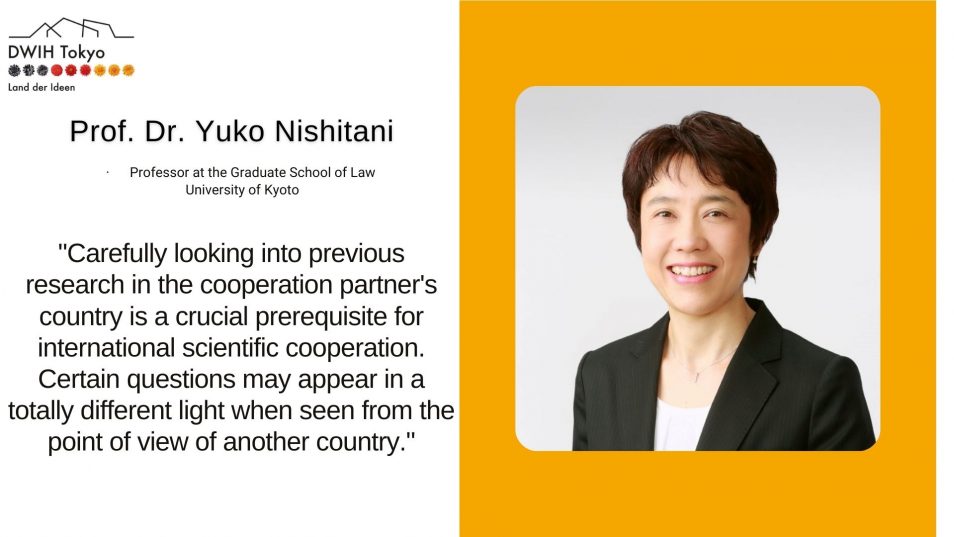Prof. Dr. Yuko Nishitani
 © DWIH Tokyo / Prof. Dr. Yuko Nishitani
© DWIH Tokyo / Prof. Dr. Yuko Nishitani
Our series “Connecting East and West – A Short Interview with…“ presents people involved in German-Japanese research collaborations – and their insights on how and where to cooperate successfully!
Prof. Dr. Yuko Nishitani teaches at Kyoto University Graduate School of Law and received the renowned Philipp Franz von Siebold Award in 2020, which is awarded for extraordinary contributions to the mutual understanding between Germany and Japan. In our DWIH interview, she shares insights into her research in law and encourages young researchers to enter international collaborations open-minded and well prepared.
1. What kind of research excites you and why?
My field of expertise is law, and I am currently particularly passionate about two research topics.
The first topic is: Cultural diversity and cross-border family relationships. These are crucial issues of any society facing migration. For example, in the case of polygamy or child marriage celebrated in the home country, the host country must weigh respect for the cultural, religious or moral background of immigrants against the values and demands for human rights in its own society. Researching the experiences in Germany as well as in other Western countries proves to be valuable, especially because Japan is also gradually growing into an immigration society and will certainly face similar issues in the future.
The second topic is: corporate social responsibility and human rights protection. Today, it is no longer sufficient to control a company’s operations in one country, as multinational corporations are conducting their activities across borders, often causing serious environmental damage or human rights violations. To hold such parent companies accountable for the activities of their subsidiaries or suppliers, Germany enacted the Supply Chain Act in 2021. The Japanese government has also begun to consider whether and to what extent to impose due diligence on global supply chains of multinational corporations. This area is developing rapidly, and I am fascinated by the fact that humanity has gradually found common values and set common goals. It is a very challenging but interesting question how a legal framework for global supply chains could work.
2. What is your connection to Germany?
Germany is, so to say, my second home country. When I was 5 years old, I spend 2 years in Giessen and attended a German kindergarten and elementary school. At that time, I could speak German perfectly – with a Hessian accent – which I have unfortunately lost since then. After that I was in Heidelberg for my Ph.D. (1994-1997) and returned to Germany for research purposes almost every year. I also lived in Hamburg and Cologne for a longer time (2009-2011). I acquired the foundations of my scientific knowledge in Germany and owe what I am today to my German teachers, colleagues, and friends.
3. Where should Germany and Japan cooperate more?
We have many common tasks before us today, such as climate change, corporate social responsibility, rebuilding society after COVID-19, fighting poverty and so on. All these challenges are embodied in the Sustainable Development Goals (SGDs) of the United Nations. In pursuit of our common goals, we should build new scientific networks and cooperation frameworks between Japan and Germany and with other countries. An international as well as interdisciplinary work environment is also crucial. This does not only apply to natural sciences but also to humanities and social sciences.
4. What is your winning formular for research cooperation?
For effective scientific collaboration, I think it is essential to communicate well, in order to understand each other’s scientific, social, financial and other constraints, and to identify common needs and issues. Often one side thinks that the partner institution pursues the same scientific interests, but certain questions may appear in a completely different light when seen through the eyes of another country. To this end, you should always look into the existing research in the partner country carefully and build your research cooperation project on that basis.
5. What advice would you give German/Japanese researchers looking for joint projects?
In my opinion, basic preparatory research is always necessary. The first step should be to visit the website your cooperation partner as well as to check and read the relevant publications. If this is not enough, you should try to find the right person or institution through personal contacts. For the field of law, I am happy to share my contacts or refer to some colleagues who are certainly willing to help. So please do not hesitate to contact me!
Prof. Dr. Yuko Nishitani
• Ph.D. in Law, University of Heidelberg
• Professor at Graduate School of Law, Kyoto UniversityPhilipp Franz von Siebold Award 2020
• Main fields of research: Private international law, comparative law, family law
• Publications include: Cultural diversity and cross-border family relationships, corporate social responsibility, citizenship and family relationships, theoretical basis of private international law, international unification of law.
Contact information:
nishitani@law.kyoto-u.ac.jp
To read other articles related to the DWIH Tokyo Interview, click here.
The DWIH Tokyo newsletter provides timely information about open calls and events from research and innovation in Germany and Japan: Click here to register for the newsletter in English
Published on: March 17, 2022
